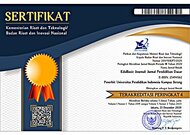The Influence of Gadget Use on The Development of Social Interaction in Children Aged 5–6 Years
Abstract
Various studies and child development experts highlight the risks of using gadgets in early childhood. A gadget is a small electronic device with various special functions that could potentially influence children’s developments. The research method used was quantitative, with a type of correlation research aimed to determine the relationship between variables of gadget use and social interaction development. The data collection technique employed a SAS (Smartphone Addiction Scale) questionnaire sheet to measure the use of gadgets and utilized Ages and Stages Questionnaires: Social Emotional (ASQ: SE) second edition to measure social interaction. The samples involved were children aged 5–6 years, totaling 39 children, 18 boys and 21 girls. The sampling technique used was purposive sampling, which used appropriate categories or criteria to be studied in selecting the sample, namely children aged 5 -6 years. This research revealed that using gadgets influenced the development of social interactions in early childhood by the sig. value of -0.500 indicating the correlation. Children use gadgets because they are more interesting, responsive, and full of challenges than playing with friends in the surrounding environment. Based on the results of this research, the implication is providing parenting to people regarding the impact of gadget use on social interactions.
Keywords
Full Text:
PDFReferences
Adwiah, A. R., & Diana, R. R. (2023). Strategi orang tua dalam mengatasi dampak penggunaan gadget terhadap perkembangan sosial anak usia dini. Jurnal Obsesi : Jurnal Pendidikan Anak Usia Dini, 7(2), 2463–2473.
Afdalia, A. P., & Gani, I. (2023). Dampak pengaruh gadget terhadap interaksi sosial anak usia dini. Al-Irsyad Al-Nafs: Jurnal Bimbingan dan Penyuluhan Islam, 10(1), 87–96.
Cesilia, C., Wulandari, D. A., & Dhamayanti, M. (2022). Validitas dan reliabilitas Ages & Stages Questionnaire: Social-Emotional 2 versi Indonesia. Sari Pediatri, 22(6), 343–350.
Chen, W., & Adler, J. L. (2019). Assessment of screen exposure in young children, 1997 to 2014. JAMA Pediatrics, 173(4), 391–393.
Fahri, L. M., & Qusyairi, L. A. H. (2019). Interaksi sosial dalam proses pembelajaran. PALAPA: Jurnal Studi Keislaman dan Ilmu Pendidikan, 7(1), 149–166.
Fitriyani, F. & Barokah, A. (2021). Language and socio-emotional development of children with speech delays: Analysis of gadget use. EduBasic Journal: Jurnal Pendidikan Dasar, 3(1), 89–96.
Genc, Z. (2014). Parents’ perceptions about the mobile technology use of preschool aged children. Procedia - Social and Behavioral Sciences, 146, 55–60.
Hartati, S., Rachmawaty, M., Rachmat, I. F. & Maryani, I. (2023). The effect of smartphone addiction in early childhood towards emotional development : A correlational study. Asia-Pacific Journal of Research in Early Childhood Education, 17(1), 49–66.
Jang, J., & Jeong, I. (2015). Related factors of smartphone addiction among preschool children. The Journal of Korean Society for School & Community Health Education, 16(1), 65–81.
Khairi, H. (2018). Karakteristik perkembangan anak usia dini dari 0-6 tahun. Jurnal Warna, 2(2), 15–28.
Kumulloh, Y., & Nurhafizah, N. (2022). Impact of gadget use on emotional development children aged 5-6 years in Khairunnisa kindergarten. EduBasic Journal: Jurnal Pendidikan Dasar, 4(1), 85–96.
Mayenti, F., & Sunita, I. (2018). Dampak penggunaan gadget terhadap perkembangan anak usia dini di PAUD dan TK Taruna Islam Pekanbaru. Phonton: Jurnal Sain dan Kesehatan 9(1), 208–213.
McCloskey, M., Johnson, S. L., Benz, C., Thompson, D. A., Chamberlin, B., Clark, L., & Bellows, L. L. (2018). Parent perceptions of mobile device use among preschool-aged children in rural head start centers. Journal of Nutrition Education and Behavior, 50(1), 83–87.
Munisa, M. (2020). Pengaruh penggunaan gadget terhadap interaksi sosial anak usia dini di TK Panca Budi Medan. Jurnal Ilmiah Abdi Ilmu, 13(1), 102–114.
Nurhamida, N., Marhun, M., & Inten, D. N. (2023). Studi deskriptif penerapan screen time terhadap aspek perkembangan anak usia dini. Jurnal Riset Pendidikan Guru PAUD (JRPGP), 3(1), 55–62.
Nurliana, N., & Aini, N. (2021). Dampak gadget terhadap komunikasi orang tua dan anak dalam keluarga di TK Negeri Pembina Kecamatan Lut Tawar. Jurnal As-Salam, 5(1), 101–109.
Oktafia, D. P., Triana, N. Y., & Suryani, R. L. (2021). Durasi penggunaan gadget terhadap personal sosial pada anak usia prasekolah: Literatur review. Borneo Nursing Journal (BNJ), 4(1), 31–47.
Oktaviana, A. (2021). Dampak penggunaan gadget terhadap interaksi sosial anak usia dini perspektif hadis. Journal of Islamic Early Childhood Education, 4(2), 145–153.
Pebriana, P. H. (2017). Analisis penggunaan gadget terhadap kemampuan interaksi sosial. Jurnal Obsesi: Jurnal Pendidikan Anak Usia Dini, 1(1), 1–11.
Prastiwi, M. H. (2019). Pertumbuhan dan perkembangan anak usia 3-6 tahun. Jurnal Ilmiah Kesehatan Sandi Husada, 8(2), 242–249.
Putri, L. A., Nikmah, N., Munisah, M., Hanum, D. F., Maharja, R., Rachmawati, A., Handajani, D. O., Indriani, H., & Rosita, R. (2022). Risk factors of smartphone addiction on pre-school children in Indonesia: Path analysis. Jurnal Ilmiah Obsgyn, 14(1), 59–70.
Retalia, R. (2020). Dampak intensitas penggunaan smarphone terhadap interaksi sosial. EduPsyCouns: Journal of Education, Psychology and Counseling, 2(2), 45–56.
Saputri, A. D., & Pambudi, D. A. (2018). Dampak penggunaan gadget terhadap kemampuan intraksi sosial anak usia dini. Proceedings of The 3rd Annual Conference on Islamic Early Childhood Education, 3(1), 265–278.
Sowmya, A. S. L., & Manjuvani, E. (2019). Usage of electronic gadgets among preschool children. International Journal of Home Science, 5(2), 1–5.
Susilowati, I. H., Nugraha, S., Alimoeso, S., & Hasiholan, B. P. (2021). Screen time for preschool children : Learning from home during the COVID-19 pandemic. Global Pediatric Health, 8, 1–6.
Talango, S. R. (2020). Konsep perkembangan anak usia dini. Early Childhood Islamic Education Journal, 1(1), 93–107.
Utami, U. R., & Alifah, S. N. (2022). Penggunaan gadget dalam pembelajaran dan perkembangan anak usia dini: Literature review. Jurnal Manajemen Mutu Pendidikan, 10(2), 38–51.
Viandari, K. D., & Susilawati, K. P. A. (2019). Peran pola asuh orangtua dan penggunaan gadget terhadap interaksi sosial anak prasekolah. Jurnal Psikologi Udayana, 6(1), 76–87.
Witarsa, R., Hadi, R. S. M., Nurhananik, N., & Haerani, N. R. (2018). Pengaruh penggunaan gadget terhadap kemampuan interaksi sosial siswa sekolah dasar. PEDAGOGIK: Jurnal Pendidikan Guru Sekolah Dasar, 6(1), 9–20.
Yuniarnia, D., & Surjaningrum, E. R. (2023). Parental perception about children’s mobile usage. Proceedings of The 1st International Conference on Indigenous Psychology & Culture (ICIPC), 1(1), 206–220.
DOI: https://doi.org/10.17509/ebj.v5i2.64157
Refbacks
- There are currently no refbacks.
Copyright (c) 2023 Universitas Pendidikan Indonesia
This work is licensed under a Creative Commons Attribution 4.0 International License.
This journal is indexed by




.png)




.png)
1.png)


1.png)

.png)